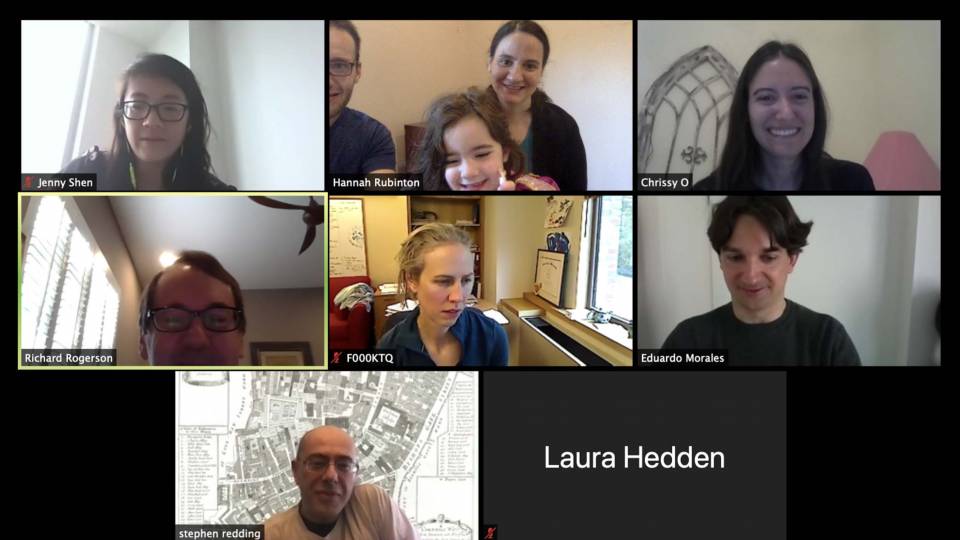PLANET EARTH — Today, April 22, 2020, marks the 50th anniversary of Earth Day, an occasion to honor our planet and recommit to protecting the future of our home for all life.
In 1962, Rachel Carson’s “Silent Spring” was published, galvanizing the environmental movement as people learned how much damage we were causing the environment through toxins. The spring was “silent” due to the poisoning of birds and insects, among other wildlife. This spring, we are hearing those particular animal sounds with greater intensity due to another kind of silence — the drop in decibels from human activity, especially traffic, as we stay at home to slow the spread of the coronavirus.
Shana Weber, director of Princeton’s Office of Sustainability and lecturer with the Princeton Environmental Institute, was in the midst of teaching her course “Investigating an Ethos of Sustainability at Princeton,” when instruction went online for the rest of the spring term. Weber’s undergraduate students returned home across the globe, and she quickly worked to maintain the community of the class through new teaching tools and new assignments. She invited students to capture soundscapes of the natural world and to reflect on the sensory experiences of this other kind of “silent spring.”
“We’ve had to force ourselves into the background because of COVID,” said Weber. “It is a chance for non-human sounds to be heard.” Listen to Weber on rethinking Earth Day amid COVID-19 on the "We Roar" podcast. Below are reflections from some of her students that were posted to the group blog as well as images from across campus.
Connor Matthews, Class of 2020
"As I listened to my soundscape, it awakened a sense of inescapability from constant human-generated noise. Prior to this experience, I was under the assumption that my small town in Montana was, for the most part, quiet and peaceful with natural noises prevailing. But, this was not the case, and it made me find a greater appreciation for going on hikes and runs outside of town to escape the constant droning of vehicles and other anthropogenic sounds. This realization was a sort of tiny, personal version of what Rachel Carson gave to the global population in 1962. Few knew that pesticides were harmful to wildlife and people prior to her publishing ‘Silent Spring’ — it made a countless number of people more aware and knowledgeable of their environment."

Eve Cooke, Class of 2022
“At Princeton, I always spent a lot of time biking when it was warm outside. I felt that I was truly in touch with nature, but the sound-scape exercise made me realize that simply zipping through a nature space on my bike with my music blasting is not enough. I need to see, hear, and experience to fully appreciate the beauty of natural surroundings. I didn't realize that the sound of my bike is louder than bird calls and scares them away. I want to spend more time in nature on foot and with my headphones out, being fully present in my surroundings. Now, every time I go outside, even if I am on my bike, I feel like I am seeing more clearly, noticing the size of flowers, the plastic in the bushes, and squirrels crossing my path. It is nice that there is a lot less traffic, but the silence is eerie rather than peaceful. I am always startled when I go into the woods and cross paths with people wearing face masks. With good reason, every interaction is more hesitant, and every person at least a little more cautious. My happiest moments are when I am flying down a hill on my bike, but sometimes even the outdoors don't feel like an escape.”

Hugues Martin Dit Neuville, Class of 2021
“Since I recorded my soundscape audio file two weeks ago Singapore has entered a nation-wide lock down, asking all of its non-essential workers to stay at home. I mentioned in my soundscape blog entry that my house was uniquely situated in-between a four lane highway and Singapore's largest nature reserve. Normally, this would mean that at different times of the day, I could either listen to the calls of birds/monkeys or the honking of cars/trucks as they lay at a standstill in the rush hour traffic. However, the lock down has led to a drastic reduction in traffic and for larger stretches of the day, the sounds of the reserve's animals are now much clearer. This has definitely made me feel more relaxed during these stressful times. In addition, although I can't interact with my neighbors on a physical level, the reduction in noise pollution has meant that I am much more aware of what each of my neighbors is doing throughout the day, purely by listening to the sounds that come from their homes (in a none creepy way, I promise). I can hear families laughing during their meals, a neighbor watering his garden or a kid down the road playing with his soccer ball. Although these human-sounds may have existed before the lockdown, they were most likely drowned out by the nearby traffic and have also been amplified by the fact that everyone is now at home. In a weird way, this has made me feel closer to my neighborhood and has provided a nice sense of community during these otherwise lonely and quiet times.
“To me, there have therefore been two sides to the change in noise pollution as a result of the COVID-19 crisis: sounds of nature such as birds, insects and monkeys have become much clearer and prominent, providing a deeper sense of connecting with the natural world, and sounds of non-invasive sounds human interactions/activity have become more frequent, providing a reassuring sense of community.”

Melanie Porras, Class of 2021
“Rachel Carson felt that humans “must choose between two roads: one leading towards apocalypse; the other towards reason.” (Dunn: Retrospective on Silent Spring 1). Although she passed away more than 50 years ago I still feel her words resonating in today’s world. I did my soundscape exercise in Prospect Garden prior to leaving campus. After the exercise, I was very aware of the sound pollution that humans have created that echoes everywhere; it was the opposite of a Silent Spring. But as I moved back home, it has become a Silent Spring for humans but a powerful spring for nature. I can hear birds chirping in the morning from my room and see robins and blue jays just a few feet away from me. I now spend more time outside, even if it’s just five minutes looking up at the trees in my backyard, I jokingly tell my parents that it’s time for my ‘daily outside time.’ Nature has been my solace in this chaotic time.
“Although COVID-19 has infected over a million humans, and killed thousands of people, some who I even know, there is still some good coming from this bad. There is less pollution in Beijing, the Himalayas are visible in India for the first time in 30 years, it seems as if the Earth is detoxifying itself. I think this is a time of reflection, a time where we as humans can think about how we got here, and how we can prevent this from occurring again. It seems as if we’re reached a fork in the road, and as Carson stated, we have the choice between two different roads. I just hope that in this time of silence, we listen to nature and pick the right road.”

Nina Grant, Class of 2021
“One of the things I had immediately noticed while analyzing the nature audio was the ever-present bird songs. I often hear them singing/talking but I hadn't realized just how constant a presence they have. Living in the suburbs though I wasn't too shocked to find out the birds were singing more often than I realized. However, thinking about this period in time as a silent spring around the world made me realize people even in more urban settings may be hearing bird songs for the first time in their homes.
Recorded outside in Mint Hill, North Carolina
“I think the current pandemic has worked similarly to [Rachel] Carson in showing us our connection to, dependence on, and place within the natural world. ‘Silent Spring’ showed the world that harming nature harms humans too. Meanwhile, the pandemic has also shown us our role in the world. Humans are not above nature. Nature has its own form of pesticides, which are currently working against humans. It has shown us how interconnected the world is and reminded us that we too are a part of the "natural" world. We are not separate from nature. We affect it and it affects us.
“The stay-at-home orders are forcing many of us to notice and interact with nature more. The new relative silence of human noises is reminding people of the beautiful world around us. With everything else shut down, more people are visiting parks or just going outside for walks. With the sounds of traffic gone, we can again hear the owls and crickets at night, I personally have enjoyed experiencing this spring and plan to continue going outside more for the recharge and renewal. However, I am almost certain that once this pandemic ends we will revert right back to our ways. Air, water and noise pollution will shoot right back up.”

Raneem Mohamed, Class of 2021
“Listening to the sound of nature is crucial to helping our minds reach a peaceful state. Every time I face any kind of stress, I would try to go outside and isolate myself from everyone around me by sitting alone and listening to music. I used to believe that breathing the outside air is the only thing that will bring my mind to rest, but after practicing listening to the sound of nature, I am realizing that paying attention and listening carefully to nature is as important for meditation as being outside. One thing that I really want to start incorporating in my life is to avoid using my headphones on runs and walks and embrace the sound of nature. I almost always go outside on those runs to meditate and destress from everything that is happening in my life but to fully succeed in achieving that I need to enjoy the sound of nature rather than trying to escape it by using headphones.
“Being stuck at home and barely hearing any traffic when I go on runs is making me appreciate being outside in nature and realize that I should never take the time I spend outside for granted and be more grateful for our environment. In this world, we spend so much of our time indoors surrounded by technology that takes our appreciation for nature away. Even when we decide to spend time with nature, we get distracted by the sound of the technology we carry, like our phones. Being forced to stay at home is making people, like me, appreciate the beautiful world we live in and realize how technology can take away the time we spend with nature. COVID-19 made me realize that the best gift parents can give their children is allowing them to spend time outside rather than supplying them with a phone that will take them away from their surroundings.”

Ryan Eusebi, Class of 2022
“As a runner, I spend a great deal of time outside, especially in parks and on trails. However, on those runs, I have always been more focused on what I was doing — not on what was happening around with me. However, for the soundscape I got the chance to hear the sounds I run through so frequently, but much more clearly this time. And with this shifted focus, I was able to hear so many sounds that I simply have never processed during my runs. Most notably, these included persistent bird chirpings and creek water flowing. I also was able to firsthand see how human interference so strongly subdues the soundscape, as the sound of a single plane flying overhead completely muted the sound of the birds. So going forward, I will probably be more aware of the natural sounds around me, and what humans might be doing to disguise the noise.
Recorded outside in Holmdel Park, New Jersey
“But now, it seems as if nature is coming back to life. It's hard to deny this beauty, and emphasizes Carson's point about how there is something worth preserving out there.”















